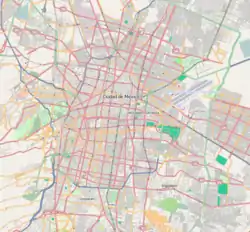| STC rapid transit | ||||||||||||||||
 Line 6 station in December 2019 | ||||||||||||||||
| General information | ||||||||||||||||
| Location | Mexico City Mexico | |||||||||||||||
| Coordinates | 19°29′06″N 99°06′16″W / 19.484921°N 99.104404°W | |||||||||||||||
| Operated by | Sistema de Transporte Colectivo (STC) | |||||||||||||||
| Line(s) | ||||||||||||||||
| Platforms | 4 side platforms | |||||||||||||||
| Tracks | 4 | |||||||||||||||
| Connections | ||||||||||||||||
| Construction | ||||||||||||||||
| Structure type | ||||||||||||||||
| Other information | ||||||||||||||||
| Status | In service | |||||||||||||||
| History | ||||||||||||||||
| Opened | ||||||||||||||||
| Passengers | ||||||||||||||||
| 2022 | Total: 13,766,306 | |||||||||||||||
| Rank | ||||||||||||||||
| Services | ||||||||||||||||
| ||||||||||||||||
| Location | ||||||||||||||||
 Location within Mexico City | ||||||||||||||||
| Area map | ||||||||||||||||
Martín Carrera is a station on the Mexico City Metro.[2][3] It is located at the borders of the Colonia Martín Carrera, Colonia 15 de Agosto, and Colonia Díaz Mirón districts in the Gustavo A. Madero borough, in the north of Mexico City.[2] The station logo depicts bust of General Martín Carrera, a national hero who fought in the Mexican–American War of 1846–48.[2][3]
General information
Martín Carrera is both a terminal station and a transfer station, linking Lines 4 and 6, both of which terminate here.[2][3] Like other terminal stations on the network, this one is multimodal: it connects with suburban bus lines that serve areas including Cerro Gordo, Vía Morelos, and others across the state line of the State of Mexico.[2] The station also connects with trolleybus line "LL", which runs between the San Felipe de Jesús neighbourhood and Metro Hidalgo.[4] The station is near the Basílica de Guadalupe, a Roman Catholic shrine and place of pilgrimage.[5]
The station was opened with the others along the northern portion of Line 4 on 29 August 1981.[6] Service along Line 6 started on 8 July 1986.[6]
Ridership
|
| ||||||||||||||||||||||||||||||||||||||||||||||||||||||||||||||||||||||||||||||||||||||||||||||||||||||||||||||||||||||||||||||||||||||||||||||||||||||||||||||||||||||||||||||||||||
References
- 1 2 3 4 5 6 "Afluencia de estación por línea 2022" [Station traffic per line 2022] (in Spanish). Sistema Transporte Colectivo Metro. 2023. Archived from the original on 5 March 2023. Retrieved 5 March 2023.
- 1 2 3 4 5 "Martín Carrera" (in Spanish). Sistema de Transporte Colectivo. Archived from the original on 8 August 2011. Retrieved 20 August 2011.
- 1 2 3 Archambault, Richard. "Martín Carrera » Mexico City Metro System". Retrieved 20 August 2011.
- ↑ "Servicios.- Servicio de Transportes Eléctricos del D.F.: Línea: LL LINEA LL SAN FELIPE DE JESÚS – METRO HIDALGO" (in Spanish). Servicio de Transportes Eléctricos. Archived from the original on 6 August 2011. Retrieved 20 August 2011.
- ↑ "Basilica of Our Lady of Guadalupe". Wikimapia. Retrieved 20 August 2011.
- 1 2 Monroy, Marco. Schwandl, Robert (ed.). "Opening Dates for Mexico City's Subway". Retrieved 20 August 2011.
- 1 2 "Afluencia de estación por línea 2021" [Station traffic per line 2021] (in Spanish). Sistema Transporte Colectivo Metro. 2020. Archived from the original on 7 March 2022. Retrieved 7 March 2022.
- 1 2 "Afluencia de estación por línea 2020" [Station traffic per line 2020] (in Spanish). Sistema Transporte Colectivo Metro. 2021. Archived from the original on 21 June 2021. Retrieved 21 June 2021.
- 1 2 "Afluencia de estación por línea 2019" [Station traffic per line 2019] (in Spanish). Sistema Transporte Colectivo Metro. 2020. Archived from the original on 8 April 2020. Retrieved 3 May 2020.
- 1 2 "Afluencia de estación por línea 2018" [Station traffic per line 2018] (in Spanish). Sistema Transporte Colectivo Metro. 2019. Archived from the original on 6 June 2019. Retrieved 7 April 2020.
- 1 2 "Afluencia de estación por línea 2017" [Station traffic per line 2017] (in Spanish). Sistema Transporte Colectivo Metro. 2019. Archived from the original on 3 May 2020. Retrieved 3 May 2020.
- 1 2 "Afluencia de estación por línea 2016" [Station traffic per line 2016] (in Spanish). Sistema Transporte Colectivo Metro. 2017. Archived from the original on 3 May 2020. Retrieved 3 May 2020.
- 1 2 "Afluencia de estación por línea 2015" [Station traffic per line 2015] (in Spanish). Sistema Transporte Colectivo Metro. 2016. Archived from the original on 3 May 2020. Retrieved 6 May 2020.
- 1 2 "Afluencia de estación por línea 2014" [Station traffic per line 2014] (in Spanish). Sistema Transporte Colectivo Metro. 2015. Archived from the original on 3 May 2020. Retrieved 6 May 2020.
- 1 2 "Afluencia de estación por línea 2013" [Station traffic per line 2013] (in Spanish). Sistema Transporte Colectivo Metro. 2014. Archived from the original on 3 May 2020. Retrieved 6 May 2020.
- 1 2 "Afluencia de estación por línea 2012" [Station traffic per line 2012] (in Spanish). Sistema Transporte Colectivo Metro. 2013. Archived from the original on 3 May 2020. Retrieved 6 May 2020.
- 1 2 "Afluencia de estación por línea 2011" [Station traffic per line 2011] (in Spanish). Sistema Transporte Colectivo Metro. 2012. Archived from the original on 7 May 2020. Retrieved 6 May 2020.
- 1 2 "Afluencia de estación por línea 2010" [Station traffic per line 2010] (in Spanish). Sistema Transporte Colectivo Metro. 2011. Archived from the original on 7 May 2020. Retrieved 6 May 2020.
External links